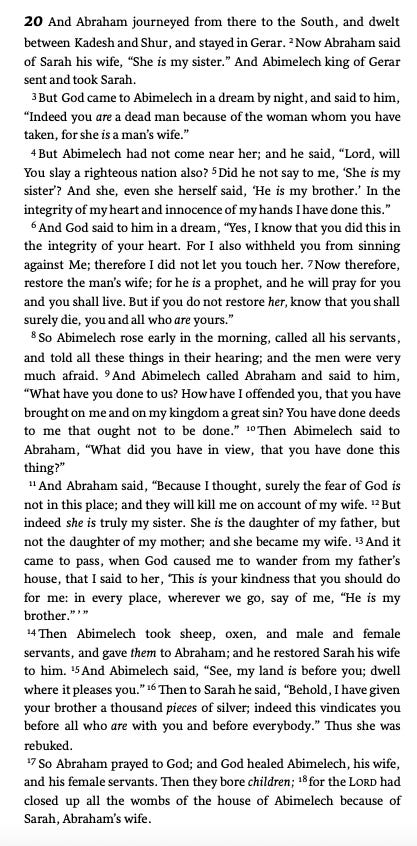No, Abraham Did Not Lie Because He Was Scared (Genesis 20:1-18)
If You Want To Understand The Bible, You Need To Know The Book of Genesis
This is the twentieth part in a multipart series on the Book of Genesis. You can find the others here:
Introduction
The story of Abraham in Gerar is a parallel to Abraham in Egypt. Both stories seem to us to be very strange. Abraham deceives the ruler of this place about the identity of his wife, then God judges the ruler for taking her, and Abraham receives plunder. If you have ever heard a sermon on this passage or read any commentary on it, it is usually condemnation of Abraham for allegedly violating the 9th Commandment and then some psychological examination of Abraham’s character. Abraham lied because he was scared. But what if this is a poor reading of the text? What if this is a very superficial reading of the text that does not take into account the greater narrative of the Book of Genesis and the scripture as a whole, and this passage’s place in that narrative?
The Serpent Steals The Bride
After the destruction of Sodom and Gomorrah, Abraham went from there to the South. When Abraham went to Egypt, it was because of a famine, but there is no famine this time, and Gerar is still within The Land. But Gerar is a Philistine city. The Philistines, if you will remember from Genesis 10, are a people descended from Mizraim (Egypt). The Philistines are a tribe of Egyptians. Abraham has gone to another Egypt, this time an Egypt inside The Land instead of outside of it.
Abraham does exactly the same thing he did before: he tells Sarah to tell everyone that she is his sister. And as soon as they get there, Abimelech, the king of Gerar, takes Sarah from Abraham. And God appears to Abimelech, telling him that he has taken another man’s wife and that he is a dead man for it. Abimelech is unhappy with God. He appears to be aware of what God has done to Sodom, but he professes his righteousness in this matter, saying he did not know that she was another man’s wife. He was told she was his sister, and so he did this thing in ignorance. God responds to him by telling Abimelech that he knows that he is innocent, which is why He has appeared to him now and kept him from sinning. God commands Abimelech to restore Sarah to Abraham, because Abraham is a prophet and he will pray for you and you will live.
Notice that God appears to him when? In the middle of the night. In a few hundred years, God would finally appear to another Egyptian in the middle of the night in judgment, telling him to let The Bride go. Like so many other times in scripture, this is a passover scene. Notice also the threat of total destruction of Philistia that Abimelech acknowledges. But unlike that Pharaoh, Abimelech’s heart is not hardened. He obeys God. He calls all his servants together in the morning and tells them of this, and they are terrified.
Abimelech calls Abraham in and chastises him, asking him why he has done this. It is usually at this point that many commentators bizarrely take Abimelech’s word for it, not realizing that this Philistine king is a Philistine and really would have just killed Abraham and stolen his wife. It is already established that they view adultery as a grave sin, but murder as merely a part of life. They take the word of a man who stands in for the Serpent rather than a man that God Himself says is a prophet. And what does Abraham say? I thought surely the fear of God is not in this place. Abraham knows what a place that does not fear God is like. He just left a place like that after it had been turned into a smoldering ruin by God. He should have pretty good judgment in this matter. And it is here that Abraham reveals Sarah’s true identity. She is his sister, his half sister, and they are in a consanguineous marriage. Setting aside for a moment that, at least at this time, still shortly after the flood, there is no moral prohibition on consanguineous marriage, Abraham did not lie to Abimelech or to Pharaoh earlier. He simply told him part of the truth. Was a wicked ruler who just grabs women from their homes to put them in their harems entitled to know the full truth? Especially given that Abraham knows what will certainly be done if he reveals the full truth?
What happens next is truly puzzling if you hold to the idea that Abraham is in the wrong here. Abimelech gives him plunder! He gives him wealth in the form of sheep, oxen, and slaves, and restores Sarah to him. He also gives him permission to dwell wherever he wants in the land. And on top of this, he gives Abraham one thousand pieces of silver. The last line of v. 16 is often taken as evidence that they did something wrong, but the reality is that it is either a mistranslation or a joke. The word rendered “rebuked” in the NKJV means to be judged or to be judged and found righteous. Some of your versions might even have a footnote indicating as such. If you are judged and the judgment is that you get a thousand pieces of silver and sheep, oxen, and slaves, you are being declared righteous!
And in response to this, Abraham prays for Abimelech’s house, and we discover that a plague (how interesting! It is almost like this is a type of the things to come in Exodus!) has befallen his house, and the wombs of the women are closed up. Abraham’s prayer opens their wombs, and they bear children once again.
That last little bit in the passage reveals what is actually going on here in the bigger picture. Think back to Genesis 3: the Seed of the Woman will crush the head of the Serpent. What has God just said is going to happen in the previous chapters? That Sarah is going to bear a son, and they will name him Isaac. We do not know precisely when Isaac was conceived. All we know is that Sodom and Gomorrah were destroyed approximately one year before Isaac’s birth. So, it stands to reason that this event took place sometime in the three months between Sodom’s destruction and Isaac’s conception. What is the Serpent doing then? This is a last-ditch effort to prevent the coming of the Seed. The Serpent cannot have children of his own; his seed is wicked men like Abimelech or Pharaoh, or the men of Sodom. By deceiving Abimelech, Abraham is protecting not only himself but his wife and the Seed. Abraham is not a coward. You’ll remember that he took a small force against the armies of multiple nations—overwhelming odds—and beat them to rescue his nephew Lot.
What this all is is a picture of the Exodus in preview. The Seed people are in “an Egypt,” the Bride is attacked, God judges this nation, and the Bride is not only restored but leaves with great treasure. That is precisely what took place in the Exodus. And this is a preview of the Exodus given to us. God is showing His people what He is going to do.
Conclusion
Think of what this means for us. God does similar things with us, doesn’t He? How often are you, as a Christian, put in positions where being faithful looks like you are a bad person to unbelieving and often very wicked people! Very often this is the price of faithfulness. Bad people are going to think that you are the transgressor and they are the righteous ones. How often have you been in situations where someone like Abimelech, who has just stolen a woman and put her in his harem, comes to you offended at what you have done?
So often we have done nothing wrong, yet we get blamed for someone else’s sin. It is one of the worst feelings that exists, to be falsely accused. One of the most excruciating scenes in the entire Bible is in the Book of 1 Kings, where Ahab and Jezebel hire men to falsely accuse Naboth of blaspheming, have him executed, and steal the vineyard for themselves. The man stood up for what was right, he defended his ancient inheritance and refused to sell it, and so he was falsely accused and killed. You read that story and your mind races back to all the times you have ever been falsely accused, to all the times where wicked people have schemed against you.
This is what Abimelech did to Abraham. He accused him of great wickedness, when in fact it was Abimelech who was the seed of the serpent that was sinning. In Abraham’s case, he was able to enjoy his vindication. God appeared and set everything right. In Naboth’s case, he went to his death, falsely accused, and lost everything, but only later did God make it right and judge Ahab and his house. All of these things point to the greatest example of false accusation of a righteous man: Jesus Christ. He was falsely accused while being absolutely and totally sinless! And He was put to death for it. But in bearing the ultimate false accusation, He also received the ultimate vindication, resurrection from the dead and ascension to rule over heaven and earth.
For the Christian, this is what you must understand when you go through trials like this. God is not mocked. God knows the truth. God will set things right, always. Not always in the timing that we would hope for, but always in the timing that is perfect and according to His plan. In this passage, the Seed is vindicated, and God prospers His covenant people into the future. In our case, He does the same for His covenant people. Like Abraham, we must trust Him to be our vindication. We must wait on Him to act and put all things right. In the name of the Father, the Son, and the Holy Spirit. Amen!




The fallen angels, "Sons of God" visited the "daughters of men" and produced offspring, the Nephilim giants, which were hybrids and not of the pure human genome which God created and honors with redemption. So, yes, Satan cannot have "children" of his own which would in any way be acceptable to God...